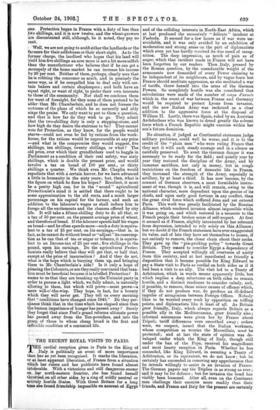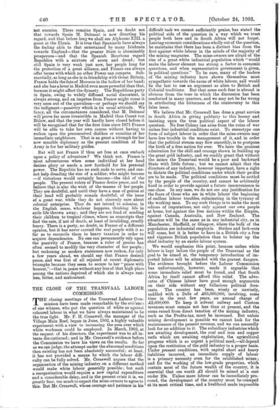THE RECENT ROYAL VISITS 'TO PARIS. HE cordial reception given
in Paris to the Kinn. of J. Italy, is politically an event of more importance than has as yet been recognised. It marks the liberation, or at least apparent liberation, of France from a situation which her rulers and her publicists have found almost iatolerable. With a victorious and still dangerous enemy on her north-eastern frontier, she has fotuid herself throttled on all other sides by a ring of coldly neutral or actively hostile Slates. With Great Britain for a long time she found friendship impossible on account of Egypt and of the colliding interests in North-East Africa, which at last produced the excessively " delicate " incident at Fashoda. It seemed for a few hours as if war were un- avoidable, and it was only avoided by an exhibition of moderation and strong sense on the part of diplomatists which even yet has hardly received its due weed of recog- nition. The deep impression, as much of pain as of anger, which that incident made in France will not have been forgotten by our readers. Then Italy, pressed by the Roman question, by the unendurable weight of the armaments now demanded of every Power claiming to be independent of its neighbours, and by vague fears lest France should meditate aggression, as she meditated a war of tariffs, threw herself into the arms of the German Powers. So completely hostile was she considered that calculations were made of the number of corps d'armie which in the event of war between France and Germany would be required to protect Lyons from invasion, and the new Italian Army was reckoned as a clear addition to the aggressive force at the disposal of William II. Lastly, there was Spain, ruled by an Austrian Archduchess who was known to dread greatly the solvent force which a French Republic might exercise within her son's future dominion.
No situation, if judged as Continental statesmen judge military problems, could well be worse, and it is to the credit of the "plain men" who were ruling France that they met it with such steady courage and in a silence so carefully preserved. To avert the German danger it was necessary to be ready for the field.; and quietly year by year they restored the discipline of the Army, and by immense sacrifices, not only in money, but in rough restrictions on the freedom of domestic life in France, they increased the strength of the Army, especially in artillery, by at least a third. It has now become, by the consent of German observers, a most formidable instru- ment of war, though it is, and will remain, owing to the national character, more dependent upon the genius of its chiefs, and upon early good fortune in any conflict, than the great rival force which suffered Jena and yet entered. Paris. This work was greatly facilitated, by the Russian Alliance, which rendered invasion almost impossible while it was going on, and which restored in a measure to the French people their broken sense of self-respect. At first it seemed as if France, slightly intoxicated by her rebound from depression, intended to rely solely on this Alliance; but we doubt if the French statesmen have ever exaggerated its value, and. of late they have set themselves to loosen, if not entirely to remove, the closer chain about their necks. They gave up the "pin-pricking policy" towards Great Britain. They ceased to consider Egypt a dependency of France. They accepted willingly all overtures of amity from this country, and at last manifested so friendly a disposition that it .became possible for King Edward to pay a State visit to Paris as cordial on both sides as if it had been a visit to an ally. The visit led to a Treaty of Arbitration, which in words means apparently little, but which implies a deep reluctance on both sides to remain hostile, and a distinct readiness to consider calmly, and, if possible, to remove, those minor causes of offence which, if they do not produce war, do produce an ill-defined impulse of antagonism between Foreign Offices. Nobody likes to be worried every week by opposition on trifling points, and diplomatists like it least of all. As Britain grew friendly, Italy, which always regards Britain as a possible ally in the Mediterranean, grew friendly also ; informal assurances were given her by France about Tripoli; tariff differences were smoothed away ; orders were, we suspect, issued that the Italian workmen, whose competition so worries the Marseillais, must be protected ; and at last the state of opinion was de- veloped under which the King of Italy, though still under the ban of the Pope, received his magnificent and most hearty reception in Paris. Whether he has succeeded, like King Edward, in securing a Treaty of Arbitration, or its equivalent, we do not know ; but he certainly has succeeded in removing any apprehension that he intends willingly to assist in an invasion of France. The German papers say the Triplice is as strong as ever ; and it may be for defence ; but for invasion the bond has visibly, been loosened. After all, even on the Continent men challenge their enemies more readily than their friends, and France and Italy for the present are certainly not enemies. There remains Spain, and we doubt not that towards Spain M. Delcasse is now directing his regard, and that before long we shall see Alphonso XIII. a guest at the Elyse. It is true that Spaniards have always the feeling akin to that entertained by many Irishmen towards England—that the greater State is abominably prosperous—and that the Spanish Bourbons regard Republics with a mixture of scorn and dread ; but still Spain is very weak just now, her people long for the protection of a great alliance, and France can always • offer terms with which no other Power can compete. Sub- stantially, so long as she is in friendship with Great Britain, France holds the fate of Morocco in the hollow of her hand; and she has a lever in Madrid even more powerful than that, • because it might affect the dynasty. The Republican party in Spain, owing to widely diffused social discontent, is always strong, and an impetus from France might rouse it .very scion out of the querulous—or perhaps we should say the indignant—passivity which is its usual attitude. We fancy, all the circumstances considered, that M. Delcasse will prove far more irresistible in Madrid than Count von Billow, and that the year will hardly have closed before it will be recognised that for the first time since 1871 France will be able to take her own course without having to reckon upon the preconceived dislikes or enmities of her immediate neighbours. That is as great a triumph for her now sensible diplomacy as the present condition of her Army is for her military guides.
. But will not France if thus set free at once embark upon a policy of adventure ? We think not. France is most adventurous when some individual at her head desires glory or needs a new foothold for his personal power. The Republic has no such ends to serve, and can- not help dreading the rise of a soldier, who might become —if victorious would certainly become—the idol of the people. The present rulers of France desire peace, and we believe that is.also the wish of the masses of her people. They are doubtful, and until they have a man of genius at their , head will probably remain doubtful, of the issue of a great war, while they do not sincerely care about colonial enterprise. They do not intend to colonise, in the English sense, whatever happens, thinking life in exile life thrown away; and they are not fond of sending their children to tropical climes, where as conscripts they find the rate, if not of death, at least of invaliding, cruelly heavy. There is a party, no doubt, in France of a different opinion, but it has never carried the real people with it so far as to reconcile them to heavy taxation in order to acquire dependencies. No one can permanently rely upon the passivity of France, because a ruler of genius has often seemed to modify the very character of her people ; but reckoning as modern statesmen now reckon, for only a few years ahead, we should say that France desired peace, and was first of all rejoiced at recent diplomatic triumphs because they seem to secure to her "peace with honour,"—that is, peace without any loss of that high place among the nations deprived of which she is always rest- less, bitter, and malcontent.























































 Previous page
Previous page